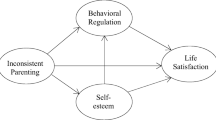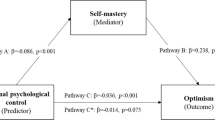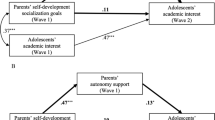Abstract
Recent theories and studies have provided evidence that parental autonomy granting is linked to adolescents’ life satisfaction, but very few studies have investigated this relationship in Chinese cultural contexts. Additionally, the potential mechanisms underlying this relationship are not comprehensively understood. This study examined whether autonomy granting parenting practice promoted adolescents’ life satisfaction and whether this link was mediated by emotional self-efficacy and future orientation among 795 Chinese junior high school, senior high school, and college students (59.87% girls). Based on a longitudinal design, autonomy granting parenting practice and emotional self-efficacy were assessed at Time 1, and future orientation and life satisfaction were assessed at Time 2. Structural equation modeling revealed that autonomy granting parenting practice was directly related to adolescents’ life satisfaction and indirectly through both emotional self-efficacy and future orientation. Furthermore, the effects of these mediators differed across the various stages of adolescence. Specially, for college students, self-efficacy in expressing positive emotions independently mediated the relationship between parental autonomy granting and life satisfaction. For senior high school and college students, self-efficacy in managing negative emotions and future orientation sequentially mediated this relationship. In addition, future orientation also mediated the relationship between autonomy granting and life satisfaction; however, the mediating effect of future orientation differed in direction for the junior and senior high school samples. These findings highlight the importance of providing adolescents with autonomy and targeting specific mediating factors to enhance life satisfaction of individuals at different stages of adolescence.


Similar content being viewed by others
Availability of Data and Material
The datasets generated during and/or analyzed during the current study are available in the figshare repository, https://figshare.com/account/articles/12518501
Code Availability
Software application or custom code is available from the corresponding author on reasonable request.
References
Azizli, N., Atkinson, B. E., Baughman, H. M., & Giammarco, E. A. (2015). Relationships between general self-efficacy, planning for the future, and life satisfaction. Personality and Individual Differences, 82, 58–60. https://doi.org/10.1016/j.paid.2015.03.006
Bandura, A. (1993). Perceived self-efficacy in cognitive development and functioning. Educational Psychologist, 28(2), 117–148. https://doi.org/10.1207/s15326985ep2802_3
Bandura, A. (2001). Social cognitive theory: An agentic perspective. Annual Review of Psychology, 52(1), 1–26. https://doi.org/10.1146/annurev.psych.52.1.1
Bandura, A., Barbaranelli, C., Caprara, G. V., & Pastorelli, C. (1996). Multifaceted impact of self-efficacy beliefs on academic functioning. Child Development, 67(3), 1206–1222. https://doi.org/10.1111/j.1467-8624.1996.tb01791.x
Bandura, A., Caprara, G. V., Barbaranelli, C., Gerbino, M., & Pastorelli, C. (2003). Role of affective self-regulatory efficacy in diverse spheres of psychosocial functioning. Child Development, 74(3), 769–782. https://doi.org/10.1111/1467-8624.00567
Barber, B. K., & Xia, M. (2013). The centrality of control to parenting and its effects. In R. E. Larzelere, A. S. Morris, & A. W. Harrist (Eds.), Authoritative parenting: Synthesizing nurturance and discipline for optimal child development (pp. 61–87). American Psychological Association.
Bi, X. W., Zhang, L., Yang, Y. Y., & Zhang, W. X. (2020). Parenting practices, family obligation, and adolescents’ academic adjustment: Cohort differences with social change in China. Journal of Research on Adolescence, 30(3), 721–734. https://doi.org/10.1111/jora.12555
Boniwell, I., Osin, E., Linley, P. A., & Ivanchenko, G. V. (2010). A question of balance: Time perspective and well-being in British and Russian samples. The Journal of Positive Psychology, 5(1), 24–40. https://doi.org/10.1080/17439760903271181
Caprara, G. V., Di Giunta, L., Eisenberg, N., Gerbino, M., Pastorelli, C., & Tramontano, C. (2008). Assessing regulatory emotional self-efficacy in three countries. Psychological Assessment, 20(3), 227–237. https://doi.org/10.1037/1040-3590.20.3.227
Caprara, G. V., & Steca, P. (2005). Self-efficacy beliefs as determinants of prosocial behavior conducive to life satisfaction across ages. Journal of Social and Clinical Psychology, 24(2), 191–217. https://doi.org/10.1521/jscp.24.2.191.62271
Caprara, G. V., Steca, P., Gerbino, M., Paciello, M., & Vecchio, G. M. (2006). Looking for adolescents’ well-being: Self-efficacy beliefs as determinants of positive thinking and happiness. Epidemiology and Psychiatric Sciences, 15(1), 30–43. https://doi.org/10.1017/S1121189X00002013
Chai, W. Y., Kwok, S. Y., & Gu, M. (2018). Autonomy-granting parenting and child depression: The moderating roles of hope and life satisfaction. Journal of Child and Family Studies, 27(8), 2596–2607. https://doi.org/10.1007/s10826-018-1102-8
Chughtai, A. A. (2021). A closer look at the relationship between life satisfaction and job performance. Applied Research in Quality of Life, 16, 805–825. https://doi.org/10.1007/s11482-019-09793-2
Cikrikci, Ö., & Odaci, H. (2016). The determinants of life satisfaction among adolescents: The role of metacognitive awareness and self-efficacy. Social Indicators Research, 125(3), 977–990. https://doi.org/10.1007/s11205-015-0861-5
Coffey, J. K., & Warren, M. T. (2020). Comparing adolescent positive affect and self-esteem as precursors to adult self-esteem and life satisfaction. Motivation and Emotion, 44, 1–12. https://doi.org/10.1007/s11031-020-09825-7
Coffey, J. K., Warren, M. T., & Gottfried, A. W. (2015). Does infant happiness forecast adult life satisfaction? Examining subjective well-being in the first quarter century of life. Journal of Happiness Studies, 16(6), 1401–1421. https://doi.org/10.1007/s10902-014-9556-x
Coffey, J. K., Xia, M., & Fosco, G. M. (2020). When do adolescents feel loved? A daily within-person study of parent-adolescent relations. Emotion. Advance online publication. https://doi.org/10.1037/emo0000767
Collins, W. A., & Steinberg, L. (2006). Adolescent development in interpersonal context. In W. Damon & N. Eisneberg (Eds.), Handbook of child psychology (Vol. 4, pp. 1003–1067). Wiley.
Cui, L., Morris, A. S., Criss, M. M., Houltberg, B. J., & Silk, J. S. (2014). Parental psychological control and adolescent adjustment: The role of adolescent emotion regulation. Parenting: Science and Practice, 14(1), 47–67. https://doi.org/10.1080/15295192.2014.880018
Daddis, C. (2011). Desire for increased autonomy and adolescents’ perceptions of peer autonomy: “Everyone else can; Why can’t I?” Child Development, 82(4), 1310–1326. https://doi.org/10.1111/j.1467-8624.2011.01587.x
Deci, E. L., & Ryan, R. M. (2000). The “what” and “why” of goal pursuits: Human needs and the self-determination of behavior. Psychological Inquiry, 11(4), 227–268. https://doi.org/10.1207/S15327965PLI1104_01
Diaconu-Gherasim, L. R., Bucci, C. M., Giuseppone, K. R., & Brumariu, L. E. (2017). Parenting and adolescents’ depressive symptoms: The mediating role of future time perspective. The Journal of Psychology, 151(7), 685–699. https://doi.org/10.1080/00223980.2017.1372349
Ferguson, Y. L., Kasser, T., & Jahng, S. (2011). Differences in life satisfaction and school satisfaction among adolescents from three nations: The role of perceived autonomy support. Journal of Research on Adolescence, 21(3), 649–661. https://doi.org/10.1111/j.1532-7795.2010.00698.x
Filus, A., Schwarz, B., Mylonas, K., Sam, D. L., & Boski, P. (2019). Parenting and late adolescents’ well-being in Greece, Norway, Poland and Switzerland: Associations with individuation from parents. Journal of Child and Family Studies, 28(2), 560–576. https://doi.org/10.1007/s10826-018-1283-1
Forrest, C. B., Bevans, K. B., Riley, A. W., Crespo, R., & Louis, T. A. (2013). Health and school outcomes during children’s transition into adolescence. Journal of Adolescent Health, 52(2), 186–194. https://doi.org/10.1016/j.jadohealth.2012.06.019
Fredrickson, B. L. (2001). The role of positive emotions in positive psychology: The broaden-and-build theory of positive emotions. American Psychologist, 56(3), 218–226. https://doi.org/10.1037/0003-066X.56.3.218
Fuligni, A. J. (1998). Authority, autonomy, and parent-adolescent conflict and cohesion: A study of adolescents from Mexican, Chinese, Filipino, and European backgrounds. Developmental Psychology, 34(4), 782–792. https://doi.org/10.1037/0012-1649.34.4.782
Gentzler, A. L., Morey, J. N., Palmer, C. A., & Yi, C. Y. (2013). Young adolescents’ responses to positive events: Associations with positive affect and adjustment. The Journal of Early Adolescence, 33(5), 663–683. https://doi.org/10.1177/0272431612462629
Gunzenhauser, C., Heikamp, T., Gerbino, M., Alessandri, G., Von Suchodoletz, A., Di Giunta, L., & Trommsdorff, G. (2013). Self-efficacy in regulating positive and negative emotions. European Journal of Psychological Assessment, 29(3), 197–204. https://doi.org/10.1027/1015-5759/a000151
Heffner, A. L., & Antaramian, S. P. (2016). The role of life satisfaction in predicting student engagement and achievement. Journal of Happiness Studies, 17(4), 1681–1701. https://doi.org/10.1007/s10902-015-9665-1
Huebner, E. S. (1994). Conjoint analyses of the students’ life satisfaction scale and the Piers-Harris self-concept scale. Psychology in the Schools, 31(4), 273–277. https://doi.org/10.1002/1520-6807(199410)31:4%3c273::AID-PITS2310310404%3e3.0.CO;2-A
Huebner, E. S., Hills, K. J., & Jiang, X. (2013). Assessment and promotion of life satisfaction in youth. In C. Proctor & P. Linley (Eds.), Research, applications, and interventions for children and adolescents (pp. 23–42). Dordrecht: Springer. https://doi.org/10.1007/978-94-007-6398-2_3
Kagitcibasi, C. (2013). Adolescent autonomy-relatedness and the family in cultural context: What is optimal? Journal of Research on Adolescence, 23(2), 223–235. https://doi.org/10.1111/jora.12041
Kerpelman, J. L., Eryigit, S., & Stephens, C. J. (2008). African American adolescents’ future education orientation: Associations with self-efficacy, ethnic identity, and perceived parental support. Journal of Youth and Adolescence, 37(8), 997–1008. https://doi.org/10.1007/s10964-007-9201-7
Klimes-Dougan, B., Brand, A. E., Zahn-Waxler, C., Usher, B., Hastings, P. D., Kendziora, K., & Garside, R. B. (2007). Parental emotion socialization in adolescence: Differences in sex, age and problem status. Social Development, 16(2), 326–342. https://doi.org/10.1111/j.1467-9507.2007.00387.x
Kruger, D. J., Reischl, T., & Zimmerman, M. A. (2008). Time perspective as a mechanism for functional developmental adaptation. Journal of Social, Evolutionary, and Cultural Psychology, 2(1), 1–22. https://doi.org/10.1037/h0099336
Lent, R. W., Singley, D., Sheu, H. B., Gainor, K. A., Brenner, B. R., Treistman, D., & Ades, L. (2005). Social cognitive predictors of domain and life satisfaction: Exploring the theoretical precursors of subjective well-being. Journal of Counseling Psychology, 52(3), 429–442. https://doi.org/10.1037/0022-0167.52.3.429
Lightsey, O. R., Jr., Maxwell, D. A., Nash, T. M., Rarey, E. B., & McKinney, V. A. (2011). Self-control and self-efficacy for affect regulation as moderators of the negative affect–life satisfaction relationship. Journal of Cognitive Psychotherapy, 25(2), 142–154. https://doi.org/10.1891/0889-8391.25.2.142
Lightsey, O. R., Jr., McGhee, R., Ervin, A., Gharghani, G. G., Rarey, E. B., Daigle, R. P., & Powell, K. (2013). Self-efficacy for affect regulation as a predictor of future life satisfaction and moderator of the negative affect–Life satisfaction relationship. Journal of Happiness Studies, 14(1), 1–18. https://doi.org/10.1007/s10902-011-9312-4
Little, T. D. (2013). Longitudinal structural equation modeling. Guilford Press.
Liu, G. X. Y., & Helwig, C. C. (2020). Autonomy, social inequality, and support in Chinese urban and rural adolescents’ reasoning about the Chinese college entrance examination (Gaokao). Journal of Adolescent Research. Advance Online Publication. https://doi.org/10.1177/0743558420914082
Liu, X., Huang, X. T., & Bi, C. H. (2011). Development of the questionnaire for teenagers’ future orientation. Journal of Southwest University (social Science Edition), 37(6), 7–12. https://doi.org/10.13718/j.cnki.xdsk.2011.06.021
Luthans, F., Avolio, B. J., Avey, J. B., & Norman, S. M. (2007). Positive psychological capital: Measurement and relationship with performance and satisfaction. Personnel Psychology, 60(3), 541–572. https://doi.org/10.1111/j.1744-6570.2007.00083.x
Lyubomirsky, S., King, L., & Diener, E. (2005). The benefits of frequent positive affect: Does happiness lead to success? Psychological Bulletin, 131(6), 803–805. https://doi.org/10.1037/0033-2909.131.6.803
Moreira, H., Gouveia, M. J., & Canavarro, M. C. (2018). Is mindful parenting associated with adolescents’ well-being in early and middle/late adolescence? The mediating role of adolescents’ attachment representations, self-compassion and mindfulness. Journal of Youth and Adolescence, 47(8), 1771–1788. https://doi.org/10.1007/s10964-018-0808-7
Morris, A. S., Silk, J. S., Steinberg, L., Myers, S. S., & Robinson, L. R. (2007). The role of the family context in the development of emotion regulation. Social Development, 16(2), 361–388. https://doi.org/10.1111/j.1467-9507.2007.00389.x
Muthén, L. K., & Muthén, B. O. (1998). Mplus user’s guide (7th ed.). Los Angeles: CA.
Niditch, L. A., & Varela, R. E. (2012). Perceptions of parenting, emotional self-efficacy, and anxiety in youth: Test of a mediational model. Child & Youth Care Forum, 41(1), 21–35. https://doi.org/10.1007/s10566-011-9150-x
Nurmi, J. E. (1991). How do adolescents see their future? A review of the development of future orientation and planning. Developmental Review, 11(1), 1–59. https://doi.org/10.1016/0273-2297(91)90002-6
Nurmi, J. E., & Pulliainen, H. (1991). The changing parent-child relationship, self-esteem, and intelligence as determinants of orientation to the future during early adolescence. Journal of Adolescence, 14(1), 35–51. https://doi.org/10.1016/0140-1971(91)90044-R
Nyhus, E. K., & Webley, P. (2013). The relationship between parenting and the economic orientation and behavior of Norwegian adolescents. The Journal of Genetic Psychology, 174(6), 620–641. https://doi.org/10.1080/00221325.2012.754398
Pérez-Fuentes, M. D. C., Molero Jurado, M. D. M., Gázquez Linares, J. J., Oropesa Ruiz, N. F., Simón Márquez, M. D. M., & Saracostti, M. (2019). Parenting practices, life satisfaction, and the role of self-esteem in adolescents. International Journal of Environmental Research and Public Health, 16(20), 4045. https://doi.org/10.3390/ijerph16204045
Peterson, G. W., Steinmetz, S. K., & Wilson, S. M. (2005). Parent-youth relations: Cultural and cross-cultural perspectives. Hawthorn Press.
Raes, F., Smets, J., Nelis, S., & Schoofs, H. (2012). Dampening of positive affect prospectively predicts depressive symptoms in non-clinical samples. Cognition and Emotion, 26(1), 75–82. https://doi.org/10.1080/02699931.2011.555474
Reed, K., Duncan, J. M., Lucier-Greer, M., Fixelle, C., & Ferraro, A. J. (2016). Helicopter parenting and emerging adult self-efficacy: Implications for mental and physical health. Journal of Child and Family Studies, 25(10), 3136–3149. https://doi.org/10.1007/s10826-016-0466-x
Roth, G., Assor, A., Niemiec, C. P., Ryan, R. M., & Deci, E. L. (2009). The emotional and academic consequences of parental conditional regard: Comparing conditional positive regard, conditional negative regard, and autonomy support as parenting practices. Developmental Psychology, 45(4), 1119–1142. https://doi.org/10.1037/a0015272
Ryan, R. M., & Deci, E. L. (2002). An overview of self-determination theory: An organismic-dialectical perspective. In E. L. Deci & R. M. Ryan (Eds.), Handbook of self-determination research (pp. 3–33). University of Rochester Press.
Seginer, R. (2009). Future orientation: Developmental and ecological perspectives. Springer.
Seginer, R., Vermulst, A., & Shoyer, S. (2004). The indirect link between perceived parenting and adolescent future orientation: A multiple-step model. International Journal of Behavioral Development, 28(4), 365–378. https://doi.org/10.1080/01650250444000081
Siahpush, M., Spittal, M., & Singh, G. K. (2008). Happiness and life satisfaction prospectively predict self-rated health, physical health, and the presence of limiting, long-term health conditions. American Journal of Health Promotion, 23(1), 18–26. https://doi.org/10.4278/ajhp.061023137
Soenens, B., & Vansteenkiste, M. (2010). A theoretical upgrade of the concept of parental psychological control: Proposing new insights on the basis of self-determination theory. Developmental Review, 30(1), 74–99. https://doi.org/10.1016/j.dr.2009.11.001
Spear, L. P. (2000). Neurobehavioral changes in adolescence. Current Directions in Psychological Science, 9(4), 111–114. https://doi.org/10.1111/1467-8721.00072
Steinberg, L. (2014). Adolescence (10th ed.). McGraw-Hill.
Steinberg, L., Graham, S., O’brien, L., Woolard, J., Cauffman, E., & Banich, M. (2009). Age differences in future orientation and delay discounting. Child Development, 80(1), 28–44. https://doi.org/10.1111/j.1467-8624.2008.01244.x
Steinberg, L., Lamborn, S. D., Dornbusch, S. M., & Darling, N. (1992). Impact of parenting practices on adolescent achievement: Authoritative parenting, school involvement, and encouragement to succeed. Child Development, 63(5), 1266–1281. https://doi.org/10.1111/j.1467-8624.1992.tb01694.x
Su, S., Li, X., Lin, D., & Zhu, M. (2017). Future orientation, social support, and psychological adjustment among left-behind children in rural China: A longitudinal study. Frontiers in Psychology, 8, 1309. https://doi.org/10.3389/fpsyg.2017.01309
Suldo, S. M., & Huebner, E. S. (2004). The role of life satisfaction in the relationship between authoritative parenting dimensions and adolescent problem behavior. Social Indicators Research, 66(1–2), 165–195. https://doi.org/10.1023/B:SOCI.0000007498.62080.1e
Sun, R. C., & Shek, D. T. (2010). Life satisfaction, positive youth development, and problem behaviour among Chinese adolescents in Hong Kong. Social Indicators Research, 95(3), 455–474. https://doi.org/10.1007/s11205-009-9531-9
Vanderlind, W. M., Everaert, J., & Joormann, J. (2021). Positive emotion in daily life: Emotion regulation and depression. Emotion. Advance Online Publication. https://doi.org/10.1037/emo0000944
Wang, Y. J., Dou, K., & Liu, Y. (2013). Revision of the scale of Regulatory Emotional Self-efficacy. Journal of Guangzhou University (social Science Edition), 12(1), 45–50.
Xu, Y., & Hamamura, T. (2014). Folk beliefs of cultural changes in China. Frontiers in Psychology, 5, 1066. https://doi.org/10.3389/fpsyg.2014.01066
Yap, S. T., & Baharudin, R. (2016). The relationship between adolescents’ perceived parental involvement, self-efficacy beliefs, and subjective well-being: A multiple mediator model. Social Indicators Research, 126(1), 257–278. https://doi.org/10.1007/s11205-015-0882-0
Zambianchi, M., & Bitti, P. E. R. (2014). The role of proactive coping strategies, time perspective, perceived efficacy on affect regulation, divergent thinking and family communication in promoting social well-being in emerging adulthood. Social Indicators Research, 116(2), 493–507. https://doi.org/10.1007/s11205-013-0307-x
Zeng, R., & Greenfield, P. M. (2015). Cultural evolution over the last 40 years in China: Using the Google Ngram Viewer to study implications of social and political change for cultural values. International Journal of Psychology, 50, 47–55. https://doi.org/10.1002/ijop.12125
Zhang, J. W., & Howell, R. T. (2011). Do time perspectives predict unique variance in life satisfaction beyond personality traits? Personality and Individual Differences, 50(8), 1261–1266. https://doi.org/10.1016/j.paid.2011.02.021
Zhang, J. W., Howell, R. T., & Stolarski, M. (2013). Comparing three methods to measure a balanced time perspective: The relationship between a balanced time perspective and subjective well-being. Journal of Happiness Studies, 14(1), 169–184. https://doi.org/10.1007/s10902-012-9322-x
Zhang, W., Wei, X., Ji, L., Chen, L., & Deater-Deckard, K. (2017). Reconsidering parenting in Chinese culture: Subtypes, stability, and change of maternal parenting style during early adolescence. Journal of Youth and Adolescence, 46(5), 1117–1136. https://doi.org/10.1007/s10964-017-0664-x
Zhang, X. G., He, L. G., & Zheng, X. (2004). Adolescent students’ life satisfaction: Its construct and scale development. Psychological Science, 27(5), 1257–1260. https://doi.org/10.16719/j.cnki.1671-6981.2004.05.068
Zimbardo, P. G., & Boyd, J. N. (1999). Putting time in perspective: A valid, reliable, individual differences metric. Journal of Personality and Social Psychology, 77(6), 1271–1288. https://doi.org/10.1037/0022-3514.77.6.1271
Acknowledgements
This work was supported by the Scientific Research Fund for High-level Talents in Shandong Women’s University (Grant number: 2019RCYJ05).
Funding
This study was funded by the Scientific Research Fund for High-level Talents in Shandong Women’s University (Grant number: 2019RCYJ05). The Scientific Research Fund for High-level Talents in Shandong Women’s University, 2019RCYJ05, Xinwen Bi
Author information
Authors and Affiliations
Contributions
All authors contributed to the study conception and design. Xinwen Bi conducted the analyses and drafted the manuscript; Shuqiong Wang conceived and coordinated the study and helped to draft the manuscript; Yanhong Ji helped to draft the manuscript. All authors commented on previous versions of the manuscript. All authors read and approved the final manuscript and the byline order of authors.
Corresponding author
Ethics declarations
Conflicts of interest
The authors declare that they have no conflict of interest.
Consent to participate
Informed consent was obtained from all individual participants included in the study.
Ethics approval
This study was approved by the ethics committee on human experimentation of Shandong Women’s University. All procedures performed in this study involving human participants were in accordance with the ethical standards of the institutional and/or national research committee and with the 1964 Helsinki declaration and its later amendments or comparable ethical standards.
Consent for publication
The work described was original that has not been published previously, and not under consideration for publication elsewhere, in whole or in part. Its publication has been approved by all co-authors and the responsible authorities at the institutions where the work has been carried out. No other manuscripts have been published, accepted, or submitted for publication using the same dataset.
Additional information
Publisher's Note
Springer Nature remains neutral with regard to jurisdictional claims in published maps and institutional affiliations.
Supplementary Information
Below is the link to the electronic supplementary material.
Rights and permissions
About this article
Cite this article
Bi, X., Wang, S. & Ji, Y. Parental Autonomy Granting and Adolescents’ Life Satisfaction: The Mediating Roles of Emotional Self-Efficacy and Future Orientation. J Happiness Stud 23, 2113–2135 (2022). https://doi.org/10.1007/s10902-021-00486-y
Accepted:
Published:
Issue Date:
DOI: https://doi.org/10.1007/s10902-021-00486-y




